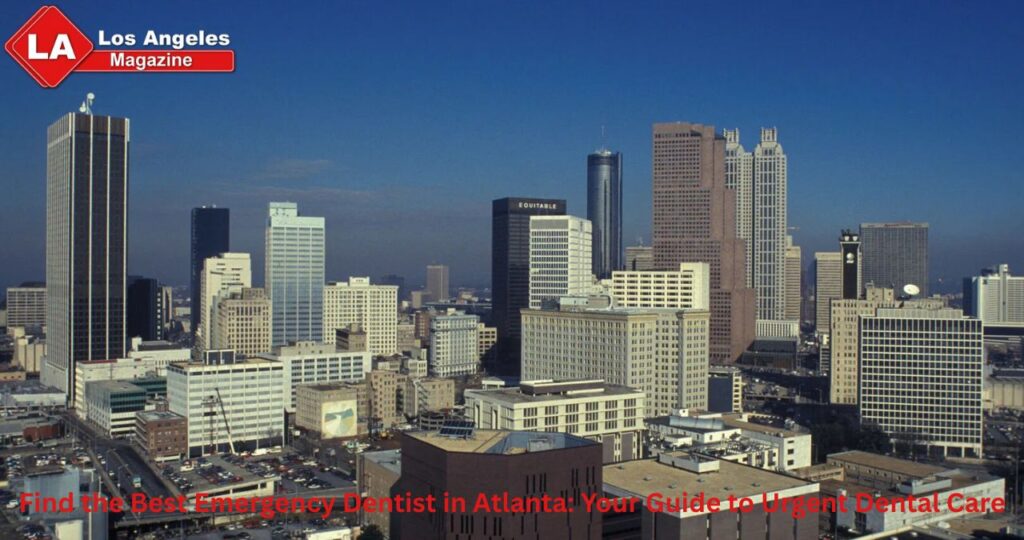When you’re hit with a dental emergency, knowing where to go is super important. Atlanta has a bunch of options for urgent dental care. Finding the right emergency dentist in Atlanta can really make a difference in how fast you recover. Here’s a rundown of the top services you can find:
24-Hour Emergency Dental Clinics
These clinics are a lifesaver for anyone dealing with sudden dental problems. They’re open around the clock, so you can get help no matter the time.
- They offer quick access to professional help for things like bad toothaches or broken teeth.
- You get peace of mind knowing you don’t have to wait until morning.
- They can stop small problems from becoming big ones.
Specialized Emergency Dental Procedures
Emergency dentists do more than just checkups. They offer specific procedures to handle urgent situations. Here are a few common ones:
- Tooth Extractions: If a tooth is too damaged, they can quickly remove it to stop the pain.
- Root Canals: To save an infected tooth, they can perform an emergency root canal.
- Repairing Broken or Chipped Teeth: They can fix teeth that have been damaged in an accident.
What to Do If You Don’t Have Insurance
Not having insurance can make a dental emergency even more stressful. But don’t worry, there are options:
- Look into financial help programs in Atlanta. These programs can help cover the costs of dental care, and some places even offer cosmetic dentistry in Atlanta.
- Talk to the dentist about payment plans. Some clinics let you pay in installments.
- Consider dental savings plans. These can help lower the cost of dental work.
Being prepared financially can really take some of the stress out of a dental emergency. Knowing your options ahead of time can make a big difference in your care and how you feel about the whole situation.
Understanding Dental Emergencies
Recognizing a Dental Emergency
So, what exactly counts as a dental emergency? It’s more than just a minor toothache. A true dental emergency involves situations that need immediate attention to stop bleeding, ease severe pain, or save a tooth. Think of it this way: if you’re in serious pain, have uncontrolled bleeding, or risk losing a tooth, it’s likely an emergency. Knowing when to act fast can really make a difference.
Common Types of Dental Emergencies
Dental emergencies come in different forms. Some of the more common ones include:
- Severe Toothaches: Pain that’s unbearable and doesn’t go away.
- Knocked-Out Teeth: Time is of the essence to try and save the tooth.
- Chipped or Broken Teeth: Can lead to pain and infection if not treated.
- Lost Fillings or Crowns: Exposes the tooth to further damage.
- Gum Infections or Abscesses: Can spread infection to other parts of the body.
It’s important to remember that dental emergencies aren’t always obvious. Sometimes, a seemingly small issue can quickly turn into a bigger problem if left untreated. That’s why it’s always best to err on the side of caution and seek professional help if you’re unsure.
Immediate Steps to Take
Okay, so you’ve figured out you’re dealing with a dental emergency. What now? Here are some quick steps you can take:
- For a knocked-out tooth: Gently rinse the tooth (don’t scrub!) and try to put it back in the socket. If that’s not possible, keep it in milk or saliva and get to the dentist ASAP.
- For a toothache: Rinse your mouth with warm water and floss to remove any food particles. You can also take over-the-counter pain medication.
- For bleeding: Apply pressure to the area with a clean cloth. If the bleeding doesn’t stop after a while, head to the emergency dentist.
| Emergency | Immediate Action |
| Knocked-Out Tooth | Rinse gently, try to re-implant, or store in milk/saliva. Seek immediate care. |
| Severe Toothache | Rinse, floss, take pain medication. |
| Bleeding | Apply pressure with a clean cloth. |
| Lost Filling/Crown | Keep the area clean, avoid chewing on that side. |
| Abscess/Gum Infection | Rinse with warm salt water, seek immediate care. |
Remember, these are just temporary fixes. You still need to see an emergency dentist to get the problem properly sorted out.
How to Choose the Best Emergency Dentist in Atlanta
Key Factors to Consider
Finding the right emergency dentist when you’re stressed and in pain can feel like a huge task. The most important thing is to make sure they’re qualified and experienced in handling dental emergencies. Don’t be afraid to do a little digging. Check out online reviews and testimonials. See what other patients have to say about their experiences. This can give you a realistic idea of what to expect.
Finding a Clinic Near You
Location, location, location! When you’re dealing with a throbbing toothache, the last thing you want is a long drive. Here’s what to think about:
- Proximity to Home or Work: A nearby clinic is super convenient.
- Traffic Patterns: Consider rush hour. A clinic that’s close geographically might be a pain to get to during peak times.
- Public Transportation: If you don’t drive, check for easy access via bus or train.
It’s a good idea to map out a few options ahead of time, so you’re not scrambling when an emergency hits. Knowing where to go can save you precious minutes when every second counts.
What to Expect During a Visit
Okay, you’ve found a dentist. Now what? Here’s a heads-up on what usually happens during an emergency dental visit:
- Initial Assessment: The dentist will ask about your pain and examine the problem area.
- Diagnosis: X-rays might be needed to get a better look.
- Treatment Plan: The dentist will explain what needs to be done and your options.
- Treatment: This could range from a simple filling to an extraction, depending on the issue.
- Aftercare Instructions: You’ll get instructions on how to care for your mouth after the procedure.
Insurance and Payment Options for Emergency Dental Care
Understanding Your Dental Insurance
Dental insurance can really help take the sting out of emergency dental costs. Most plans will cover some portion of emergency treatments, but the exact amount can vary quite a bit. It’s a good idea to check your policy details beforehand. Things to look for include:
- Does your plan cover emergency visits?
- Are there specific limits on what they’ll pay for certain procedures?
- Is there a deductible you need to meet before coverage kicks in?
Also, using a dentist who’s in your insurance network usually means lower out-of-pocket costs because they’ve already agreed to certain rates with your provider. Don’t forget to keep an eye on your plan’s annual maximum, as emergency treatments can use that up pretty quickly.
Payment Plans and Financial Assistance
If you’re worried about affording emergency dental care, don’t panic! Many clinics offer ways to make it easier to manage the costs.
- See if the clinic has payment plans where you can pay off your bill in installments.
- Some places offer discounts if you pay in cash.
- There are also dental savings plans that can help reduce the overall cost of treatment.
It’s always worth asking the dental office about their payment options upfront. They might have something that works for your budget, so you can get the care you need without stressing too much about the money.
What to Do If You Don’t Have Insurance
Not having insurance doesn’t mean you’re out of options.
- Start by asking the dental office if they offer any discounts for patients without insurance.
- Look into clinics that have payment plans, allowing you to spread out the cost over time.
- Consider a dental savings plan to lower costs.
It’s also a good idea to explore community dental clinics or dental schools in your area, as they often provide lower-cost care. Don’t hesitate to call around and ask about pricing and payment options – you might be surprised at what’s available.
Emergency Dentist vs. Emergency Room
It’s easy to panic when a dental issue pops up, especially at odd hours. Knowing where to go – an emergency dentist or the emergency room – can save you time, money, and a whole lot of stress. Let’s break down the differences.
When to Visit an Emergency Dentist
Emergency dentists are your go-to for problems directly related to your teeth and gums. They’re equipped to handle things like severe toothaches, broken or knocked-out teeth, infections, and damaged fillings or crowns. They can provide immediate relief and treatment to address the root cause of the issue. Think of them as specialists for your mouth.
Benefits of Choosing an Emergency Dentist
- Specialized Care: Emergency dentists have the specific tools and knowledge to deal with dental emergencies effectively.
- Faster Treatment: They can often see you quicker than an ER, especially for dental-specific issues.
- Cost-Effective: Generally, a visit to the emergency dentist will be less expensive than an ER visit for the same dental problem.
It’s worth noting that emergency rooms are not typically equipped to handle detailed dental work. They can address pain and potential infections, but they usually can’t fix the underlying dental problem. This means you’ll likely need to see a dentist afterward anyway.
Understanding the Differences
So, when should you head to the ER instead of an emergency dentist? The ER is better suited for situations involving trauma to the face, like broken bones, deep cuts, or uncontrolled bleeding. They can also handle severe infections that have spread beyond the mouth and are affecting your overall health. Here’s a quick comparison:
| Feature | Emergency Dentist | Emergency Room |
| Main Focus | Teeth, gums, and immediate oral health issues | Overall health, trauma, and life-threatening conditions |
| Treatment | Fillings, extractions, root canals, pain relief | Stabilizing injuries, managing severe infections |
| Cost | Generally lower for dental-specific problems | Higher, especially for non-life-threatening dental issues |
| Expertise | Specialized dental knowledge and equipment | Broad medical knowledge, but limited dental expertise |
Preparing for a Dental Emergency
It’s easy to overlook preparing for a dental emergency, but a little foresight can make a big difference when the unexpected happens. Being ready can reduce stress and help you get the care you need quickly.
Creating a Dental Emergency Kit
Putting together a dental emergency kit is a smart move. Think of it as your first line of defense before you can get to a dentist. Here’s what I recommend including:
- Pain relievers: Over-the-counter options like ibuprofen or acetaminophen can help manage pain.
- Temporary filling material: You can find this at most drugstores, and it’s great for lost fillings or crowns.
- Dental floss: To remove any debris that might be causing discomfort.
- Small container with a lid: If a tooth gets knocked out, you’ll need something to put it in (preferably milk or saline solution).
- Gauze: For stopping any bleeding.
Keeping Important Information Handy
Having key information readily available will save precious time during an emergency. Make sure you have:
- Your dentist’s contact information: Keep their phone number and address easily accessible.
- Insurance details: Have your insurance card or policy number handy.
- A list of any allergies or medical conditions: This is important for the dentist to know.
- Emergency contact information: Someone who can help you if you’re unable to handle things yourself.
Establishing a Relationship with a Dentist
Having a dentist you know and trust is a huge advantage. Regular check-ups aren’t just about keeping your teeth clean; they’re about building a relationship with someone who knows your dental history.
Finding a dentist you like before an emergency strikes means you won’t be scrambling to find someone when you’re already stressed and in pain. Plus, regular visits can help prevent some emergencies in the first place. It’s a win-win!



